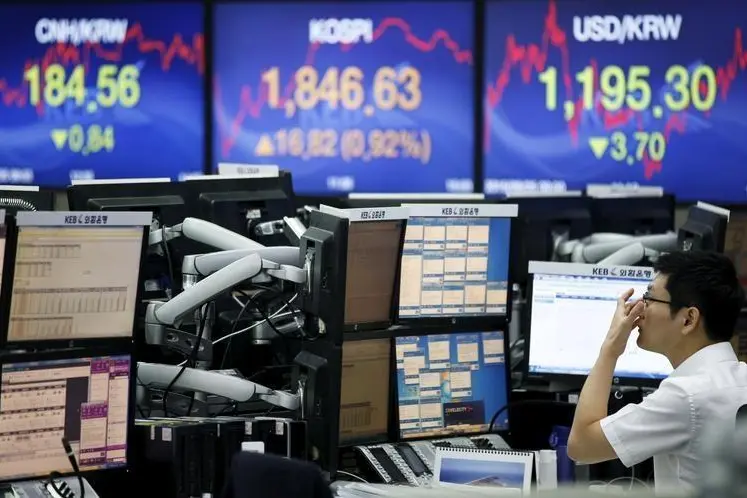PHOTO
Global markets have enjoyed a rally this year, but investors were jolted from their complacency after the US and China trade tensions came to the fore.
Markets were volatile in September, although the rise of MSCI World Index by 1.9% masks the uncertainty surrounding global economy and investor sentiment.
In September, the Organization for Economic Cooperation and Development said the global economy faces new risks due to government inaction and growing trade uncertainty.
“What looked like temporary trade tensions are turning into a long-lasting new state of trade relationships,” OECD chief economist Laurence Boone told Reuters.
“The global order that regulated trade is gone and we are in a new era of less certain, more bilateral and sometimes assertive trade relations,” she added.
The global economy will see its weakest growth since the 2008-2009 financial crisis this year, slowing from 3.6% last year to 2.9% this year before a predicted 3.0% in 2020, the OECD said.
The World Bank and International Monetary issued similar warnings in October.
In the United States, the Federal Reserve cut interest rates in July and September to stimulate the economy that’s facing a slowdown in the pace of growth and hiring. While the economy continued to add jobs, the pace of growth of aggregate hours worked in the economy has slowed meaningfully.
The S&P 500 managed to rise 1.7% during the month, reversing a 1.8% decline in August, and is up 18.7% for the year. The S&P had jumped well over 3,000 points during the months but pulled back amid trade tensions and domestic issues facing the United States.
The European Central Bank also cut rates in September as the Eurozone continues to see lacklustre economic data especially in the key market of Germany.
Other ECO measures included a tiered deposit rate to soften the impact of negative rates on the banking system, and details on a new refinancing operation to encourage lending. Outgoing president Mario Draghi then passed the baton not to incoming ECB President Christine Lagarde, but to EU lawmakers, saying fiscal policy should be the main tool going forward. The idea that the ECB has played its hand fueled a negative market reaction, even if the actual policy measures went beyond expectations.
Germany’s DAX was up 4.1%, while the DJ Stoxx 600 rose 3.6% in September on expectations of stimulus.
The UK’s FTSE 100 also managed a 2.8% gain, even as the political outcome of the Brexit remained in limbo. Prime Minister Boris Johnson continues to negotiate with the European Union to avoid a hard Brexit at the end of October but us facing considerable obstacles.
“We continue to expect the UK economy will avoid a ‘technical’ recession in Q3 (two consecutive quarters of declining GDP) but that hardly means the economic outlook is improving,” according to Royal Bank of Canada. “But the economy’s underlying pulse remains weak with PMI data pointing to ongoing contraction in the manufacturing and construction industries, and further softening in the services sector. Negative sentiment is clearly weighing on business investment, which declined in five of the last six quarters.”
Amid this uncertain backdrop, even safe haven gold prices fell 3.1% in September, to $1,472.49 per ounce, but it’s up nearly 15% for the year. Brent crude oil, which had jumped 10% during the month due to the attack on oil facilities, but ended the monthly only 1.4% higher to $59.25 per barrel after Saudi Aramco announced that its full capacity will come on stream soon.
EMERGING ECONOMIES
China’s economy also continues to disappoint with key indicators such as industrial output growing at a slower pace of 4.4%, compared to an average of 7% at the start of 2018. Retail sales were also slowing to 7.5% versus 10% in early 2018.
MSCI Asia Pacific was up 2.1% during September, while the Hong Kong’s Hang Seng Index was up 1.4%.
Emerging market equities delivered -1.9% over the third quarter.
Investment bank JP Morgan notes that the global economy faces several binary and highly unpredictable risks. Will the trade war escalate? Will a UK election lead to a no-deal Brexit? Will the recent tension in the Middle East escalate and cause another spike in the oil price? And will companies respond to slowing growth and profits by cutting jobs?
“Until we have more clarity on the answers to these questions, we continue to believe that it makes sense to avoid overweight positions in equities and credit and to move up in quality within both,” the Wall Street bank noted. “Within equities, large cap, quality, value stocks are likely to prove most resilient if the downside risks materialise.”





















